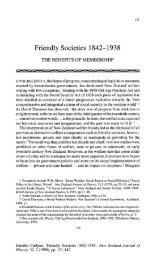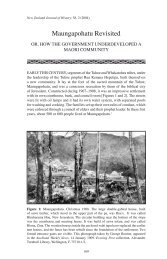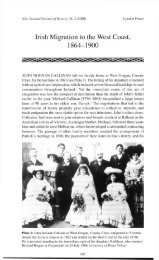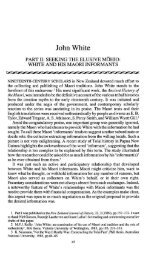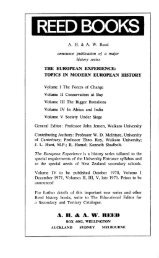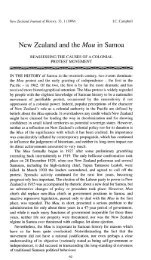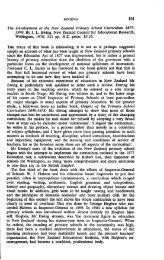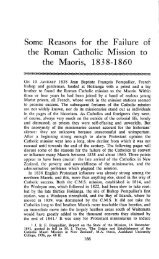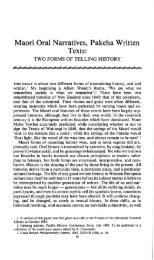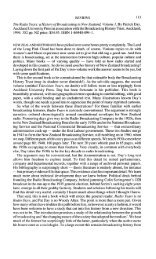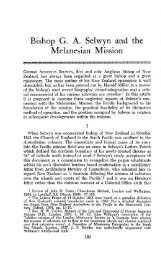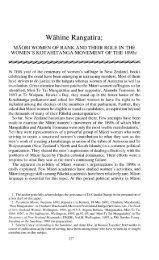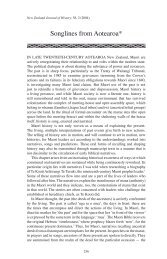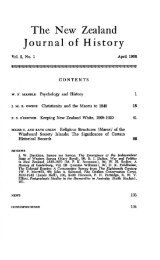John White - New Zealand Journal of History
John White - New Zealand Journal of History
John White - New Zealand Journal of History
Create successful ePaper yourself
Turn your PDF publications into a flip-book with our unique Google optimized e-Paper software.
JOHN WHITE 163<br />
A censorious attitude to particulars <strong>of</strong> Maori culture did not mean <strong>White</strong> was<br />
unappreciative <strong>of</strong> other features, intellectual or personal. In the 1856 lecture on<br />
'Maori Superstitions', he admitted that the Maori were reasonably intelligent<br />
and possessed a singularly retentive memory. 38 The private journal refers to a<br />
number <strong>of</strong> Maori with whom he developed sound friendships. One in particular,<br />
Te Aho, <strong>of</strong> the Mahurehure hapu at Waima, was described as 'the only good<br />
friend I have, he tells me my faults without any resirve [sic], if I use a word (as<br />
he thinks) improperly, he is sure to tell me in very strong language, as he is good<br />
tempered and rather witty I put up with him'. 39 On a number <strong>of</strong> occasions <strong>White</strong><br />
commented on Te Aho's abilities both to argue, or 'korero' as he called it, and<br />
to tell him 'tales', that is, traditions. 40 He was also, to judge from journal reports,<br />
a most perspicacious critic <strong>of</strong> <strong>White</strong>'s own work.<br />
<strong>White</strong>'s attitude to Maori women was more complex. Very early in the journal<br />
he wrote: 'we have a very good looking servant girl about 20, daughter <strong>of</strong> the<br />
Kahakaha who was shot in the Ohaeawai fight he was on[e] <strong>of</strong> the rebels, if she<br />
had been a European she would have been , no tales lest some one see this'. 41<br />
Another Maori female is identified as Mihirangi. They met while he was staying<br />
with her relatives on a fishing holiday. He described her as 'rather good looking'<br />
and 'rather good tempered'. Over the next few days there was a good deal <strong>of</strong><br />
banter amongst the party: 'took dinner and had a piece <strong>of</strong> fun with the Natives<br />
teaching them rounders, I noticed Mihi looked rather foolish when we were in<br />
her company, after tea was listening to Natives telling tales, Mihi asked me to tell<br />
them one, I promised to do so the next evening. . . was told that Mihi was in love<br />
with me, how laughable, no wonder she "sang a song <strong>of</strong> her own composing"<br />
with the addition <strong>of</strong> my name, tis a pity young ladies should be so lavish <strong>of</strong> their<br />
love, without asking the beloved's opinion'. Told by his host's wife that<br />
Mihirangi was singing about him, he affected not to know and suggested that<br />
perhaps she was angry with him. He subsequently heard she had asked her father<br />
if she could marry him. The following February he heard she had been quite ill,<br />
since<br />
she says that she loves —, which is the cause <strong>of</strong> her illness I pity her poor girl but cannot<br />
help her, no doubt it was that 'Lady <strong>of</strong> Lake' [a story he told them] which made her love<br />
38 AJHR, 1861, E-7, pp. 16, 36.<br />
39 PJ, 22 March 1847; 17 June 1847. Wiremu Te Aho <strong>of</strong> Waima is recorded as writing to <strong>White</strong><br />
on 3 July 1848; see D.R. Simmons, The Great <strong>New</strong> <strong>Zealand</strong> Myth, Wellington, 1976, p. 427.<br />
40 e.g. PJ, 18 February 1847; 10 February 1848. The first <strong>of</strong> these references does not specify Te<br />
Aho by name, though given the frank nature <strong>of</strong> the comments he is known to have made he seems<br />
the likeliest Maori to have uttered some <strong>of</strong> the unsourced comments. For example, <strong>White</strong> once<br />
commented to 'the Native boy' how 'saucy' it was for the sun to set so quickly; 'he with<br />
astonishment said "you are a great swearer what an oath to the sun," it is a wonder he does not come<br />
down and carry us up and burn us for your sin.' PJ, 11 February 1847. The earlier journal entries<br />
for Te Aho progressed from descriptions such as 'the Native boy' to the incorporation <strong>of</strong> additional<br />
references to 'the Priest's son', who in turn was alternately called 'Aho' and later still 'Te Aho'.<br />
That these references did concern the same individual is further supported by consistent descriptions<br />
<strong>of</strong> him as quite young: ten or 12, or 'a mere child'. See, PJ, 3 July, 13 November 1846; 10<br />
February, 22 March, 17 June 1847; 10 February 1848.<br />
41 PJ, 17 June 1846.



